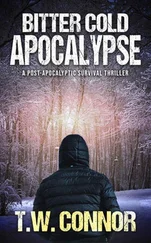Reinhardt grabbed the loose wire dangling above his battery. “If that were the case”— click —”surely your sister”— snap —”would have given ample warning.”
He had a point. But Gretel had her own purposes, her own reasons for doing things. It was possible she had foreseen an attack and had chosen to stay silent; perhaps the best outcome came about when Klaus and Reinhardt arrived from the north, rather than being present when the attack came. Klaus expressed this to Reinhardt.
“You're making excuses for her,” Reinhardt said. “Perhaps she wanted us on the road, so that we could get to Berlin when the invasion came.”
Klaus didn't voice his suspicion that Gretel worked according to her own plan, a blueprint to which the war was merely a side note. Instead, he said: “My first instinct is to protect the Reichsbehorde. Gretel must know that. I am certain it's what she foresaw.”
“You can't bear to be away from her, can you?” Reinhardt sneered. “You two always were overly close.”
The electric tingle of the Gotterelektron surged back into Klaus's mind. “This is perfect. I'm getting a morality lecture from a necrophiliac.”
The air around Reinhardt shimmered with another surge of heat. Klaus gritted his teeth, grabbed Reinhardt, dematerialized, and pulled him outside through the side of the truck before it went up in flames. They landed in a puddle, which instantly flashed into vapor. The contact with Reinhardt blistered Klaus's hands. It was painful.
“That's it,” said Reinhardt. “You're going to smolder to death.” Mud bubbled beneath his boots.
Spalcke, who had been riding with Kammler in the truck behind them, was standing on the road. “What are you two doing? And why have we stopped? I gave no order to halt.”
To Spalcke, Klaus said, “Shut up.” And to Reinhardt, he said, “Just listen to me for a moment.”
Spalcke's lips moved silently while he clenched and unclenched his jaw. He appeared to come to the same conclusion their driver had, deciding it wasn't in his best interests to get involved if Klaus and Reinhardt fought.
Klaus turned his attention back to Reinhardt as the salamander was gearing up for an attack. He held up his hands. “Wait! We're wasting time. This won't achieve anything, and it won't get you to Berlin any sooner.”
Reinhardt narrowed his eyes. “You agree we should go east, then?”
“No. I propose we split up. You go to Berlin, and I'll return to the farm.” He pointed. “You take one truck. I'll take another.”
This settled the matter because it gave Reinhardt what he wanted. After that, they quickly worked out the logistics over Spalcke's vocal but ultimately impotent objections. They split the remaining batteries evenly between the three trucks. Reinhardt took a driver, another one of the LSSAH men who'd been transferred to the Reichsbehorde and who knew how to swap out batteries. Spalcke, Kammler, the radio operator, and the third driver were consigned to the last truck. When Spalcke started to yell about insubordination and tribunals and courts-martial, the air around him shimmered briefly before he doubled over.
They were ready to depart for their separate destinations within fifteen minutes. As Klaus climbed into his truck—the one that stank of melted Bakelite—he said, “Go find your glory, Reinhardt.”
“Go find your beloved sister.”
Klaus's driver put the truck into gear. A stack of charged batteries sat piled on the seat between them.
They turned right at the crossroads, heading south. They were followed by a second truck, which carried Kammler and Spalcke and the large store of depleted batteries. Klaus watched in the side mirror as Reinhardt continued east through the intersection. A few seconds later, the road curved, and Reinhardt's truck disappeared from view.
The south road was just as icy and snowbound as the roads they'd driven out of Bielefeld. Klaus urged the driver to greater and greater speeds. And to his credit, the driver kept them on the road, though nothing could have been fast enough for Klaus. Rather than clearing the roads as Kammler and Reinhardt had done, Klaus willed the entire truck insubstantial when they encountered snowdrifts, stuck automobiles, and other obstructions. Spalcke and Kammler quickly fell behind.
The weather improved as they neared the Reichsbehorde. Icy roads became slushy roads, then muddy roads, then roads. Snow-heavy tree boughs became naked limbs popping with green buds. It was as though they had traveled from the depths of winter to a pleasant springtime over the course of a hundred kilometers. Klaus massaged his aching fingers, waiting.
They were minutes from the farm, sunlight and shadow flashing over their truck as they barreled past oak and ash trees, when Klaus heard the first explosion. The ground heaved. A crack echoed through the forest.
The driver pushed his foot to the floor. Klaus checked the gauge on his battery, reassuring himself it held a complete charge.
They emerged onto the Reichsbehorde grounds. The facility hummed with frantic activity. Cargo trucks lined the gravel drive. Mundane troops and white-coated technicians ran between the trucks and the buildings, loading the trucks with crates, filing cabinets, specialized electrical and medical equipment. A row of troop transports had been parked on the training field. Klaus realized they had brought reinforcements to defend the farm, and now the empty transports were being used to evacuate personnel. Klaus saw one of the Twins being pushed into a transport. There was no sign of Gretel.
They skidded to a halt in front of the ice house. The staccato chatter of automatic weapons fire rippled through the forest on the eastern edge of the farm, along with the rumble of diesel engines and the rattle-clank of tank treads. Klaus saw movement and flashes of red in the trees.
He jumped from the truck and hit the ground at a dead run. The metallic tingle peculiar to fresh batteries buzzed into that place in his head where his willpower resided.
Another explosion. More gunfire, closer now. Close enough for Klaus to hear screaming.
Gretel wasn't in the first transport. Or the second. Or the third. She certainly wasn't loading equipment, and she wasn't advising the reinforcements. Nobody knew where she had gone.
Klaus found his sister in the barracks that had replaced their sleeping quarters in the demolished farmhouse. She was sitting on a cot, back to the wall, thin legs stretched out before her and ankles crossed, reading poetry. A rucksack lay at her feet.
“Gretel!”
The corner of her mouth quirked up. She dog-eared her current page, closed the book, and looked at him. “Welcome home, brother.” The ground shook again. Gunfire chattered outside, followed by the thump of a mortar shell and more yelling. She scratched her nose. “Did you have a successful trip?”
“We have to leave.” Klaus grabbed her hand and hauled her off the cot. “They're evacuating the facility. We need to get to the training field.” He pulled her toward the outside wall.
“Wait,” she said. She pointed at the rucksack. “We'll need that.”
The sack clattered like ceramic or glass when he lifted it. “Don't worry,” she said. “I've packed for you, too.”
They emerged on the training ground. Klaus half pulled, half dragged Gretel toward the waiting transports. He was just about to grab her waist and hurl her aboard when a line of tanks burst through the tree line. Klaus glimpsed red stars on the tanks as they maneuvered into a semicircle that blocked egress from the field. Their treads churned up clods of earth as they advanced on the evacuees. The Red Army had arrived at the Reichsbehorde.
Klaus swore. He pulled Gretel in a new direction. “This way! I have a truck.”
Читать дальше









